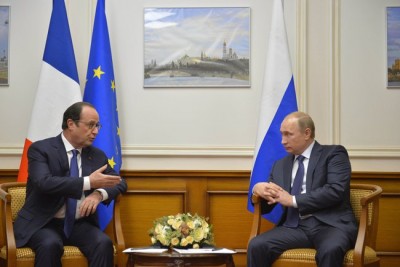“Going After the Bad Guys”: The Putin-Hollande Two-Step “Counter-Terrorism Partnership”

It is fascinating to watch the game afoot between Russian President Vladimir Putin and French President François Hollande. Here is a ‘partnership’ that defies conventional politics.
Both nuclear-armed nations, also both permanent members of the UN Security Council, are engaged in their own idea of a ‘war against ISIS’, but with very different strategic views.
The Russian President has been more straight-forward, backing long-standing ally Syria and eventually moving serious air power into the Levant, in coordination with the Syrian Government, consistent with international law. The French President, on the other hand, who has long backed armed Islamist groups against the Syrian Government, now finds himself looking for support in his quest for revenge on the terrorists who carried out the November 13 massacres in Paris.
Many, not least President Bashar al Assad, have said that France has now tasted the bitter medicine it has been feeding Syria for the past five years. As well as arming Islamist groups France has contributed a high proportion of the Europeans who have gone to Syria for their ‘jihad’. Yet Hollande is now compelled to act.
For his part, President Putin is clearly using the NATO rhetoric (pretending that they oppose the same Islamists they have armed and funded) to isolate and limit direct confrontations. He has done this with Israel and perhaps thought he had done it with Turkey. Drawing France into the Russian camp would imply greater respect for the Syrian state and army, while dividing and weakening NATO strategy in the region.
France was already a member of the ineffective US-led coalition against ISIS, which has become notorious for only moving against the terrorist group when it suits US interests. So, for example, the US herded the ruthless jihadists away from some Kurdish areas in north Iraq and Syria, but allowed large ISIS convoys to advance on and take over Palmyra, and allowing ISIS to drive hundreds of oil tankers, with stolen Syrian oil, up into Turkey.
Hollande clearly feels he has to distinguish himself from this game, in the wake of the Paris attacks. But what can he do? His position, as stated in the 26 November press conference (video link below) is still to demand a Syrian transitional government which excludes President Assad (most recently re-elected in June 2014) yet, at the same time, to engage with Russia (since October clearly the most powerful foreign force against ISIS) and to admit that the Syrian Army must be part of any anti-ISIS coalition. Those last two elements distinguish the French position from that of Washington.
France has not abandoned its neo-colonial view of Syria, the country it in fact colonised between the 1920s and 1946. Back then France also tried to treat Syrian communities as sectarian entities, but faced a series of national independence wars, the first led by Sultan Pasha al Atrash in 1925.
When France itself was occupied and humiliated by Nazi Germany, between 1940 and 1944, it sought refuge in an Atlantic Charter (August 1941) which proclaimed ‘the right of all people to choose the form of government under which they live’. But the big powers always practised double standards. US President Roosevelt’s secretary told French General Henri Giraud in 1942 ‘it is thoroughly understood that French sovereignty will be re-established as soon as possible throughout all the territory over which flew the French flag in 1939’. That of course included Syria.
In the current context Hollande seems to be drawing on a French mythology of semi-independence within the NATO-European context, a sort of French ‘third way’. He engages with Washington (the undisputed leader of NATO) but tries to reconcile that position with Moscow. Hollande has said he will ‘coordinate air strikes’ on ISIS with Russia (a step further than the US) and even that he will ‘reconcile the west’ with Russia.
Given the deep differences and limited French power, can he do this? Will the Putin-Hollande two-step be as fragile as the Putin-Erdogan accord? Watch the body language and reactions of these two in their most recent joint press conference.
The full press conference, with English audio:
https://www.youtube.com/watch?v=FwLNDXuU2Zg

